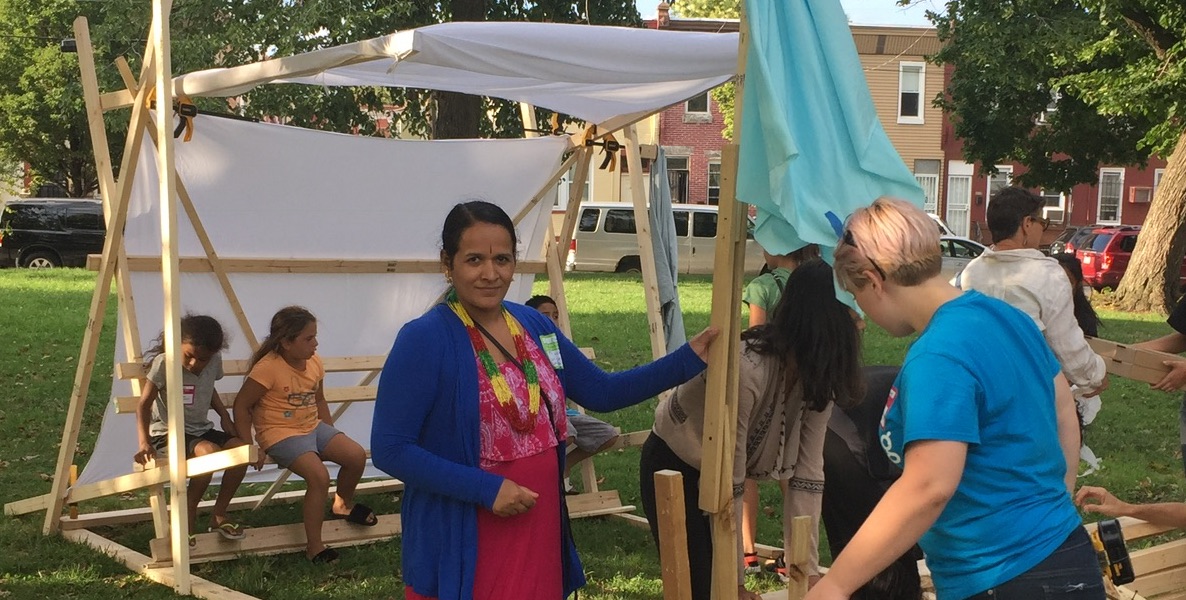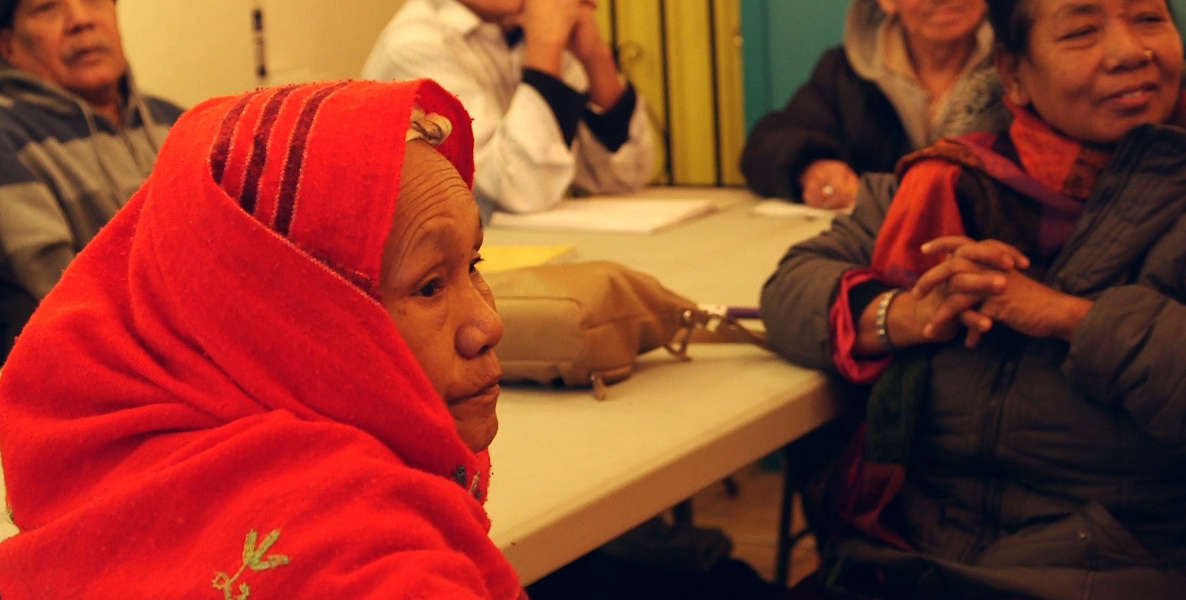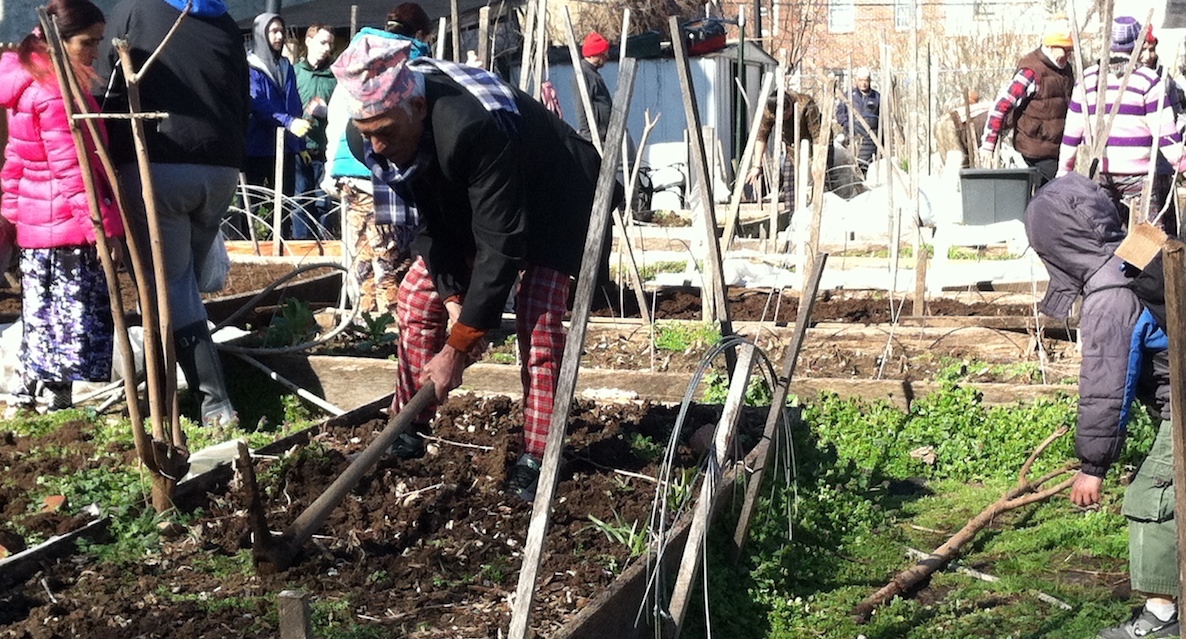In Mifflin Square Park, there are rainbow-shaded picnic benches, and multiple swingsets and jungle gyms. There’s an impromptu volleyball court—a net strung out over a tract of land in the southwest corner, and a worn-down basketball court. But none of these are the first things that come to mind when residents in nearby Cambodia Town discuss the park.
It’s the cop car.
In October 2015, the neighborhood park experienced two nights of gun violence in a row. In one night, more than 50 gunshots were fired, leaving two men injured and one 19-year-old dead, gun in hand. The police responded by shutting down what had been a robust informal park economy of Cambodian and Vietnamese food vendors, connecting the unlicensed food trucks with a lawlessness they said led to violence. (Never mind that nearby 7th Street seems to be littered with unlicensed barbecue vendors.)
The aim of rebuilding Mifflin Square Park is to get the neighborhood more directly involved in these caretaking and rebuilding initiatives in general. “This is about engaging neighbors,” says Toy. “It’s about getting the neighborhood involved in building things, and then it becomes steward work.”
The police also kept a constant patrol in the park for more than a year that consisted of a single police cruiser parked right in the middle of the public square. It was a constant reminder of those two violent nights—and of the way that this corner of South Philly feels left out of the improvement efforts that surround it.
“This place is right in between Pennsport and South Philly, and neither of them wants to claim it,” says Andy Toy, development and communications manager at neighborhood group Southeast Asian Mutual Assistance Association Coalition (SEAMAAC). “They don’t seem to view this park as their park at all.”
Now, SEAMAAC is trying to rebuild Mifflin Square Park to change its image—and with it, the image of the neighborhood that surrounds it.
Cambodia Town isn’t an officially designated neighborhood in Philadelphia; you won’t find it on any of those neighborhood maps that Philadelphians put up in their bathrooms. It’s a corridor on the east side of Broad Street in South Philly that is home to a growing population of immigrants and the children of immigrants, largely from Southeast Asia.
Cambodia Town, and South Philly in general, have been a destination for southeast Asian immigrants for more than 40 years, following the war and unrest in Vietnam, Cambodia and Laos. It’s a busy, growing neighborhood, as it must be: According to the Brookings Institution, the number of foreign-born Southeast Asian Philadelphians is growing every year, and often they make a home in South Philly. Many of them don’t speak English, and according to the Census Bureau, the geographical area that includes Cambodia Town is also among the poorest in the area.
It’s an ethnic enclave in remarkably ethnically diverse South Philly, and it certainly feels as though it is its own, independent entity, with shops and restaurants and temples and community centers catering to their immigrant neighbors—like a smaller, newer Chinatown across town.
And Mifflin Square Park, taking up a whole block in the heart of the neighborhood, is as desirable a piece of real estate as there is in this part of Philadelphia, and is only a few blocks away from trendier neighborhoods like East Passyunk and Pennsport. Renovating this public space, says Toy, would be a huge step toward changing the way people feel about Cambodia Town.
While not dilapidated, Mifflin Square’s features are antiquated. The basketball courts’ wooden backboards are as worn down as the decades-old jungle gym, and the landscaping is lacking; the aforementioned volleyball court is little more than a set from Dick’s, and most of the playsets are tagged with graffiti. But Toy says that these aren’t even the first things that folks from the neighborhood want fixed.
“A lot of them really just want a bathroom,” he says.
Mifflin Square Park is only a few blocks away from trendier neighborhoods like East Passyunk and Pennsport. Renovating this public space would be a huge step toward changing the way people feel about Cambodia Town.
But the bathroom is a problem for down the line. The park has gotten little attention from the powers that be—largely, Toy says, because of the lack of capital and political power in the neighborhood that surrounds it. Toy, who grew up in Boston but has lived in Philly for most of his life, has spent the last year lobbying for help, and has brought in loads of supporters and backers, including the William Penn Foundation, the Mural Arts Project, the Bhutanese Association, the Cambodian Association and United Communities; the William Penn Foundation, in particular, is supporting SEAMAAC’s pilot programs in the park over two years. Councilman Squilla is also supporting SEAMAAC’s efforts.
In the long term, SEAMAAC has grander schemes for Cambodia Town. The group is trying to assist the street food vendors, whose ‘cues were shut down last year, by creating what Toy calls Vendor Village—a safe space in the park, where vendors could sell food with the blessing of the Health Department. (That effort is funded by a $175,000 grant from the Knight Foundation.) The group is also working with local businesses to improve the neighborhood’s struggling commercial corridor.
Ultimately, the aim of rebuilding Mifflin Square Park is to get the neighborhood more directly involved in these caretaking and rebuilding initiatives in general. “This is about engaging neighbors,” says Toy. “It’s about getting the neighborhood involved in building things, and then it becomes steward work.”
For now, though, they’re continuing to search for partners in their mission to rebuild Mifflin Square Park. On a recent drizzly afternoon, a group of about a dozen volunteers came out to one of several planned community builds for Mifflin Square, part of SEAMAAC’s efforts to keep the neighbors involved in the changes around them. They are there to build seating prototype benches for new seating areas.
“We’ve been collecting data,” says Toy. “Individually, we’ve touched almost 400 people, door to door. We’ve probably knocked on 1,000 doors to get 400. And we’ve had individual meetings where we brought people together to look at a board that represented the park, and they put down what they wanted to see.”
One volunteer, Raphael Castro, is an assistant District Attorney who grew up in South Philly. He is a SEAMAAC board member who acknowledges that there is still a lot of work to be done. “I think public safety is one of the things that has to come to this park,” he says. That’s why he and others are pushing to have better lighting installed in the park, which would make it a place where folks could enjoy an evening walk, and that would attract people to night-league athletics.
Besides tables and lighting, the park will need to have graffiti cleaned, sidewalks dug up, athletic fields lined, jungle gyms fixed, and a basketball court may have to be turned on its axis. But the volunteers seem eager to get things moving and, for the moment, the cop car appears to be far from everyone’s mind.
“And what kind of stuff would you want to see in a new seating area?” asks Alex Gilliam of Public Workshop, who is leading the seating build, to his crowd of helpers.
A little kid in a Boy Scout shirt raises his hand. “A swing,” he says.
“Maybe,” says Gilliam with a smile.
Header Photo: Mifflin Square Park




